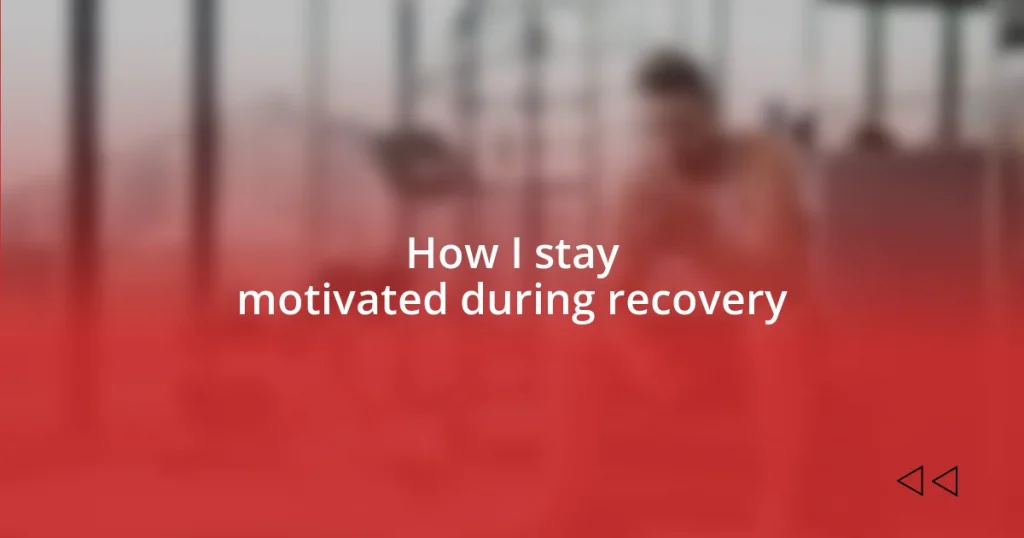Key takeaways:
- Recovery is a unique, non-linear journey that requires patience and embracing emotional ups and downs.
- Setting realistic, achievable goals and celebrating small milestones boosts motivation and confidence throughout recovery.
- Finding support from others and incorporating self-care techniques, such as mindfulness and journaling, are crucial in navigating the recovery process.
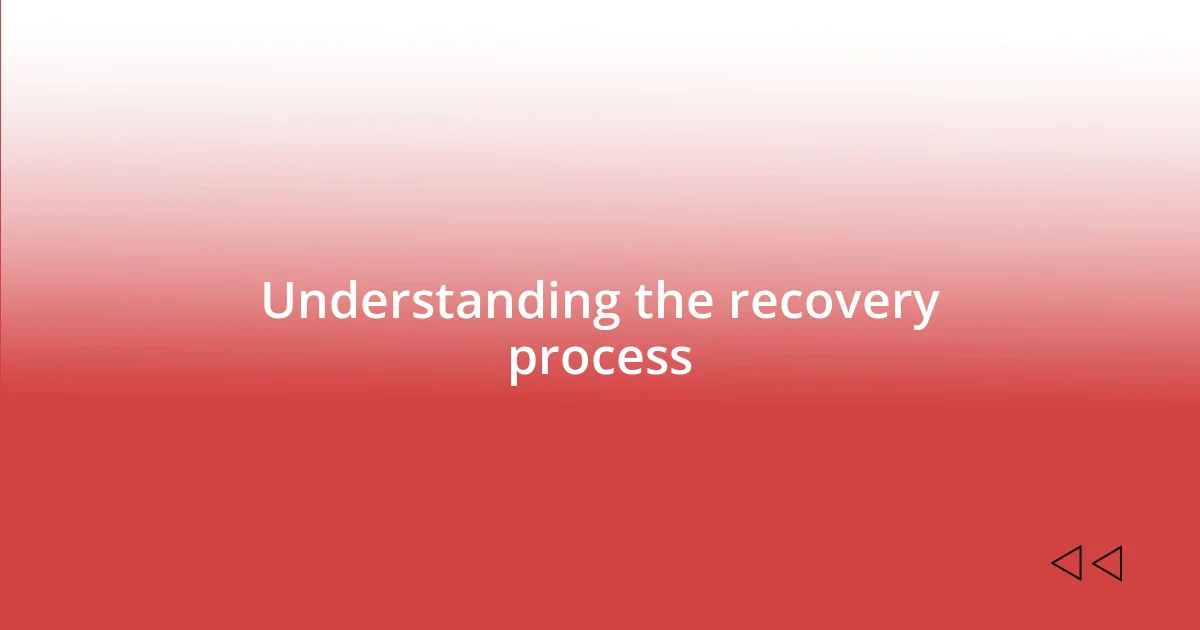
Understanding the recovery process
The recovery process is often a winding journey, filled with unexpected turns and challenges. I remember those moments of frustration when progress felt slow, and I questioned myself: “Am I ever going to feel normal again?” It’s essential to recognize that recovery isn’t a straight line; it involves ups and downs, and it’s perfectly okay to have those mixed feelings.
Understanding that recovery is unique for everyone can be both liberating and daunting. At times, seeing others make swift progress left me wondering if I was falling behind. But I learned that patience is key—and that everyone has their own timeline. I found comfort in knowing that each person’s path is different and that my journey was just as valid.
It’s crucial to embrace the emotional landscape during recovery. I often faced a whirlwind of emotions, from hope to despair. I started journaling to sort through my feelings; this practice not only helped me cope but also offered insights into my progress. Have you ever stopped to consider how your emotions shape your experience? Recognizing these feelings can provide clarity and strength as you navigate the recovery journey.
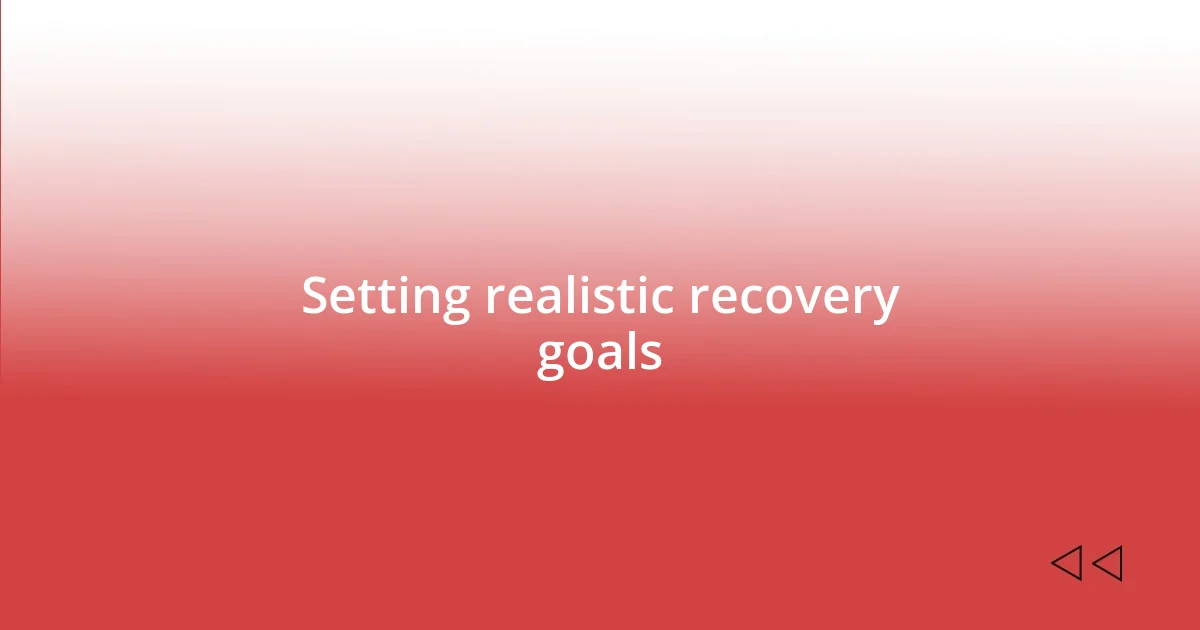
Setting realistic recovery goals
Setting realistic recovery goals is crucial in maintaining your motivation throughout the journey. I still vividly remember crafting my first set of goals; they felt like a mix of hopeful aspirations and daunting challenges. I learned quickly that when I set goals that were too ambitious, I inadvertently set myself up for disappointment. Instead, I found success in breaking down larger objectives into smaller, achievable steps. This approach not only felt more manageable but also allowed me to celebrate those small victories, which hugely boosted my confidence.
To aid in setting realistic goals, consider the following tips:
– Align goals with your current capabilities: Evaluate where you are now and set goals that stretch you but are still possible.
– Use SMART criteria: Make your goals Specific, Measurable, Achievable, Relevant, and Time-bound.
– Focus on progress, not perfection: Celebrate each milestone, no matter how small.
– Adjust as needed: Life happens, so be flexible and reevaluate your goals if necessary.
– Seek support: Share your goals with others who can encourage you and hold you accountable.
I remember sharing my goals with a close friend during my recovery. Their encouragement uplifted me on days when I felt overwhelmed, reinforcing that reaching out for support is a powerful part of the journey. It’s about creating a framework where you can experience growth without the added pressure of unrealistic expectations.
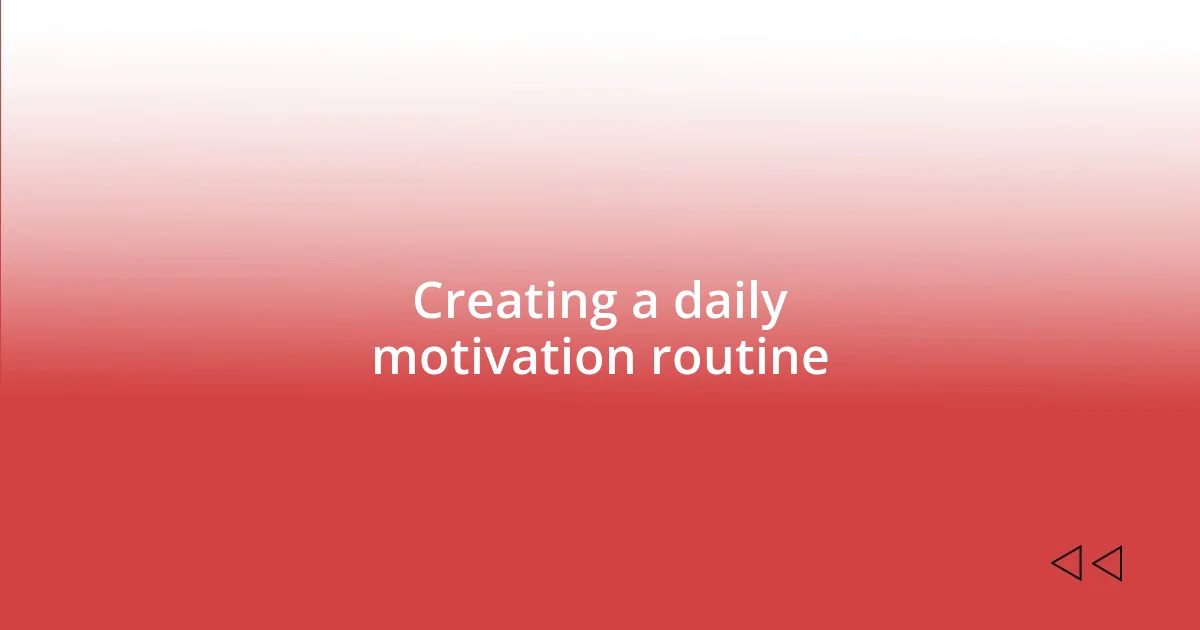
Creating a daily motivation routine
Creating a daily motivation routine has been a game-changer for me during recovery. I remember the early days, when I felt lost without structure. Establishing a consistent routine helped me channel my energy in a positive direction, ensuring I had dedicated time for self-care activities like meditation or reading. Have you ever considered how a little routine can ground your day? It’s fascinating how that sense of normalcy can uplift your spirits.
One effective strategy I found is to start each day with a simple affirmation. I used to doubt my ability to stay motivated, but repeating phrases like “I am making progress” became my anchor. Adding small rituals, like morning stretches or a gratitude list, fostered a positive mindset. It built momentum throughout my day, reminding me that every step forward counts—even the smallest ones.
Incorporating time for reflection at the end of the day is another vital element of my routine. I take a few moments to jot down my accomplishments, no matter how minor. This practice not only celebrates daily successes but also allows me to reconnect with my goals. It’s a gentle reminder that recovery is a journey, and every effort is worth acknowledging.
| Motivation Practices | Benefits |
|---|---|
| Morning Affirmations | Boosts self-esteem and sets a positive tone for the day. |
| Daily Routines | Provides structure and fosters a feeling of normalcy. |
| Gratitude Journaling | Encourages reflection on the positive aspects of recovery. |
| End-of-Day Reflection | Celebrates small victories and reinforces progress. |
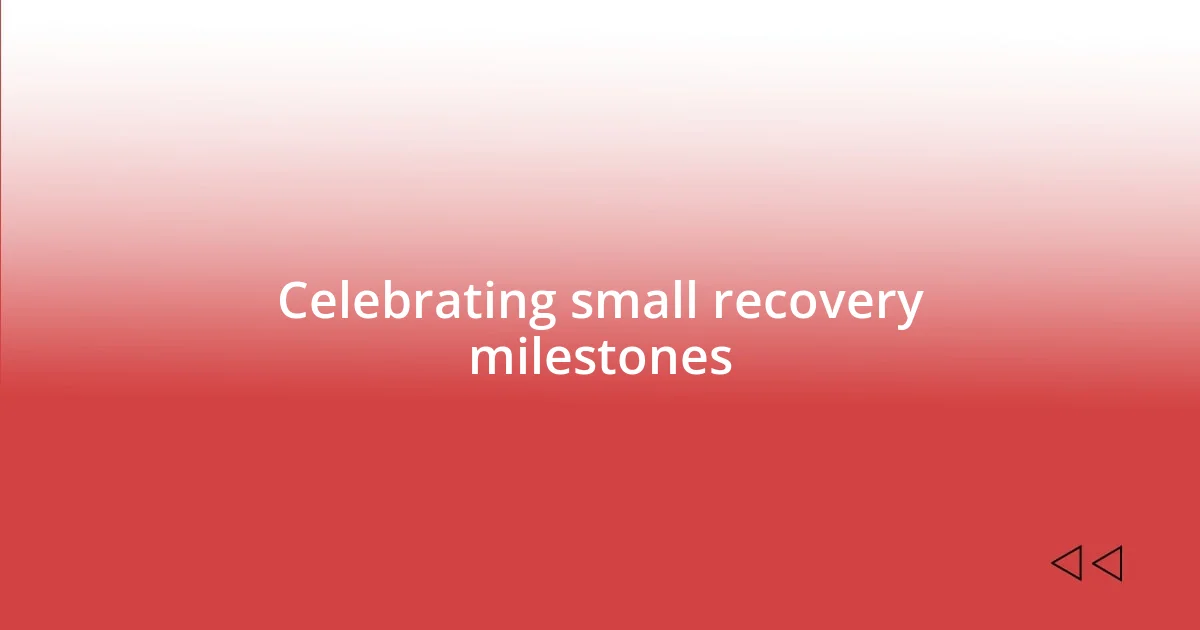
Celebrating small recovery milestones
Celebrating small recovery milestones has been a crucial part of my journey. I learned that each time I hit a little target, like getting out of bed at a reasonable hour or finishing a chapter in a book, it was worth honoring. Have you ever felt that rush of joy from achieving something you initially thought was insignificant? It’s like finding a hidden treasure within yourself—something that fuels the fire to keep pushing forward.
One of my favorite ways to celebrate these tiny victories was to treat myself to something special. Whether it was indulging in my favorite hobby or simply enjoying a quiet moment with a warm cup of tea, those little rewards made all the difference. It might seem small, but acknowledging these moments not only uplifted my spirits but also instilled a sense of pride in my progress. Have you considered what small rewards could motivate you? I found that even trivial treats became powerful incentives to maintain momentum.
I recall a specific time when I celebrated a week of consistent journaling. Instead of dismissing it as just another self-care task, I treated it as a significant milestone—one worth toasting with my favorite dessert. I realized then that these celebrations didn’t just mark progress; they transformed the recovery process into a collection of joyous moments. So, why not take a moment to reflect on what milestones you can celebrate next? It’s these little celebrations that remind us of our resilience and encourage us to keep moving forward with hope and determination.
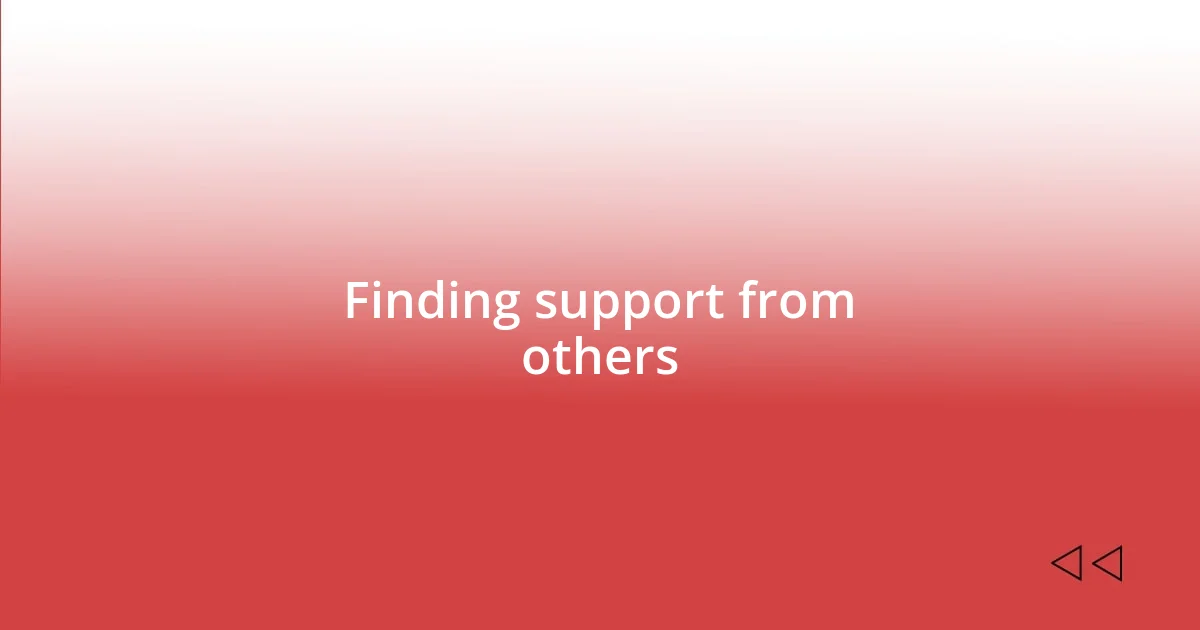
Finding support from others
Finding support from others has truly made a difference in my recovery journey. Early on, I reluctantly reached out to a friend, thinking I didn’t want to burden anyone with my struggles. However, sharing openly about my feelings was liberating. Have you ever discovered the power of simply being heard? It turns out that talking to someone who understands can lighten the emotional load and provide much-needed encouragement.
Joining a support group was another game-changer for me. I remember stepping into that room for the first time, feeling a mix of anxiety and hope. Sharing my experiences with others and hearing theirs made me realize just how common our feelings were. This shared vulnerability created an instant bond. Isn’t it fascinating how connection can emerge from shared struggles? Knowing that I wasn’t alone in my challenges gave me a renewed sense of courage to face each day.
Another valuable aspect of finding support has been the role of mentors. I remember reaching out to a former colleague who had gone through a similar experience. Their insights helped me navigate difficult moments. It made me think—who do you admire in your life that could offer guidance? Connecting with someone who’s walked a similar path not only inspires resilience but also provides practical strategies that can be incredibly helpful. In many ways, their journey becomes a roadmap for mine, guiding me toward hope and recovery.
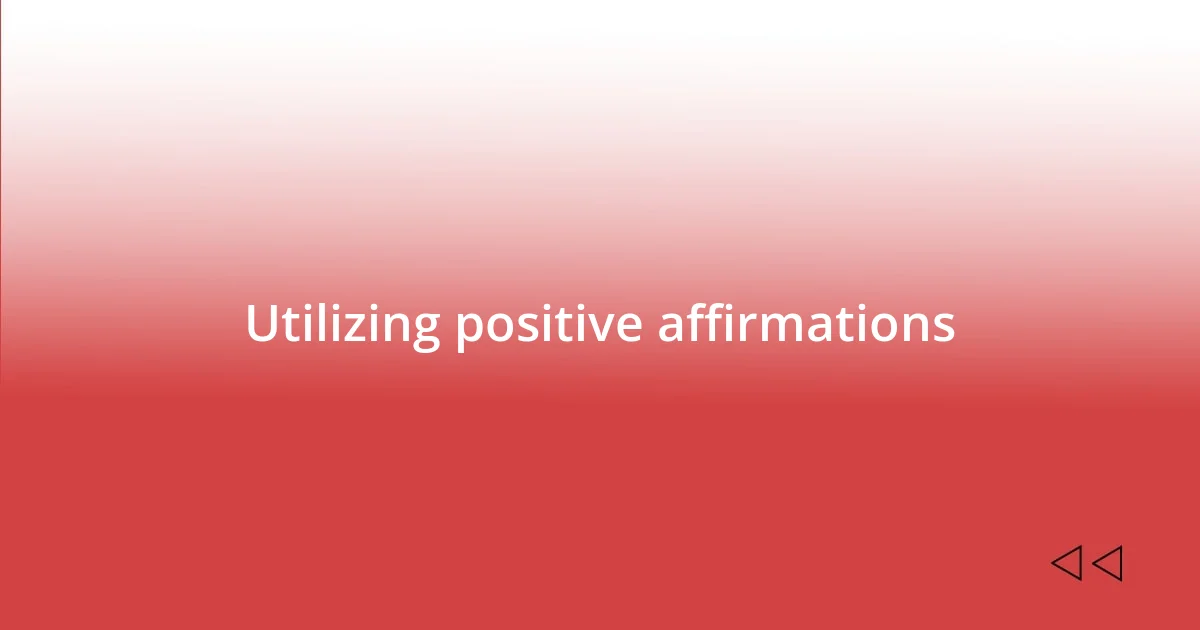
Utilizing positive affirmations
Positive affirmations have been a transformative tool in my recovery process. Each morning, I stand in front of the mirror and remind myself, “I am capable, I am resilient, and today is a new opportunity.” It might sound simple, but those words carry a weight that often shifts my mindset. Have you ever tried affirmations? I can tell you they can turn a negative day into one filled with hope and positivity.
I remember one particularly tough day when self-doubt crept in like an uninvited guest. Instead of spiraling into that familiar haze of negativity, I took a moment to repeat my affirmations. “I am strong enough to face this challenge.” I could almost feel the shift inside me, as if my own voice was pushing back against the negativity. Saying those words out loud sparked a surge of confidence that nudged me to take that first step out the door. It’s empowering when you realize that you have the ability to influence your mindset with your own words.
Sometimes, I write my affirmations down and stick them on my fridge or in my journal, so I can see them often. This constant reminder helps me stay focused on my journey. What about you? Have you thought about where you might place your affirmations? I find that visually engaging with them strengthens their impact. It’s like planting seeds of positivity in my daily life, allowing growth even on the hardest days.
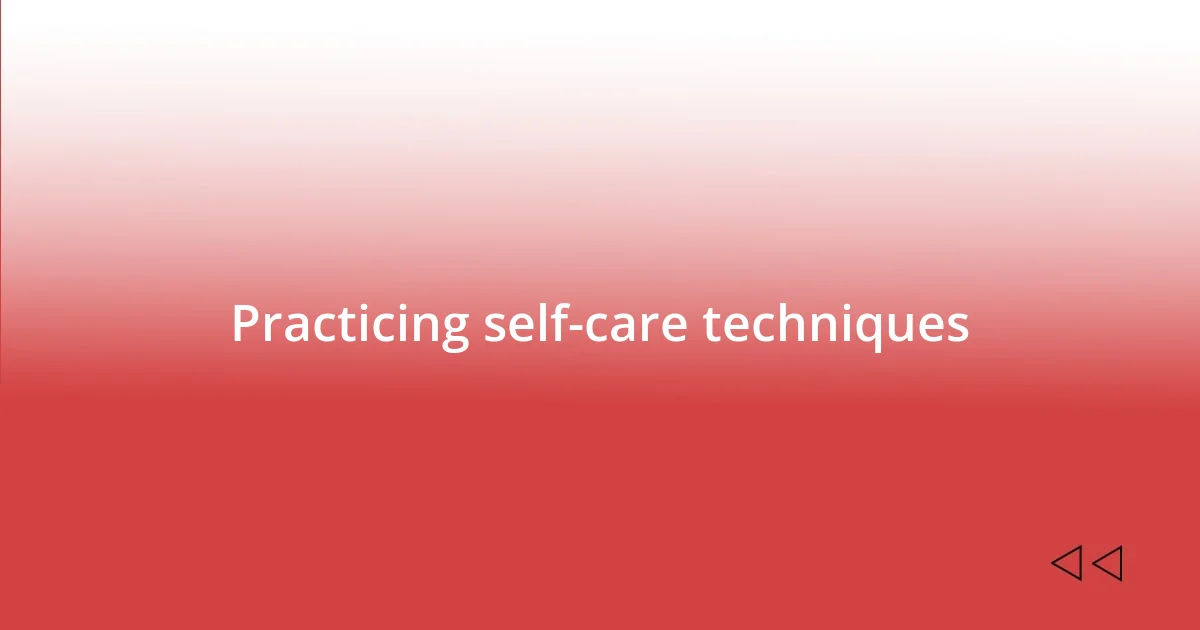
Practicing self-care techniques
Practicing self-care techniques has become an essential part of my recovery journey, allowing me to nurture both my mind and body. One technique that stands out is taking time for mindfulness. I remember feeling overwhelmed by racing thoughts, so I decided to start each day with a few minutes of deep breathing and meditation. Have you ever tried just sitting in silence, focusing on your breath? It’s incredible how those moments of stillness can ground me, pulling me away from chaos and into a space of peace.
Another self-care practice I cherish is the art of movement. Whether it’s a brisk walk or a gentle yoga session, engaging my body helps release pent-up energy and stress. I once had a day when everything felt heavy, and instead of succumbing to it, I put on some music and danced around my living room. How often do we forget that moving our bodies can literally change our mood? That moment transformed my energy, leaving me not just lighter, but also more connected to my feelings and needs.
I’ve also embraced the ritual of journaling. Putting my thoughts on paper provides clarity and allows me to process emotions I might otherwise bury. I recall an evening when sadness washed over me unexpectedly, and instead of pushing it away, I opened my journal and poured out my heart. Have you experienced the catharsis of writing? That practice not only revealed my fears but also illuminated paths forward. It’s astonishing to see how self-care can take many forms, each one vital to navigating the complex landscape of recovery.










